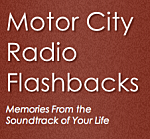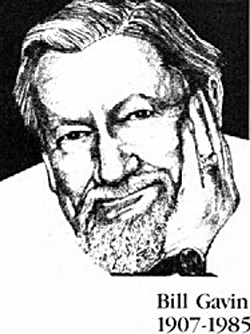 From the MCRFB NEWS archive: 1964
From the MCRFB NEWS archive: 1964
The Bill Gavin Newsletter December 5, 1964
From the Desk of Bill Gavin Billboard Contributing Editor
MANY YEARS AGO, before radio and television brought the World Series into our homes, some of our metropolitan newspapers would display large scoreboards high on their buildings so that the inning-by-inning progress could be followed by all who cared to wait and watch. Large crowds of baseball fans would cluster around, and as each inning was posted there would be cheers or groans, depending on prevailing sympathies.
 The impatient anxiety with which many radio people await each succeeding Pulse or Hooper report is reminiscent of those baseball fans a half century ago. The audience measurement surveys keep the score; they report who is winning; they tell the station manager and his program director whether their programming was good; they tell the advertiser how large an audience he can expect for his commercials on each and every station. There is a saying among radio people that “you live and die by the numbers.”
The impatient anxiety with which many radio people await each succeeding Pulse or Hooper report is reminiscent of those baseball fans a half century ago. The audience measurement surveys keep the score; they report who is winning; they tell the station manager and his program director whether their programming was good; they tell the advertiser how large an audience he can expect for his commercials on each and every station. There is a saying among radio people that “you live and die by the numbers.”
Of course, there are many people in radio – probably a large majority – who take a fairly detached view of audience measurement reports. They are experienced professionals enough to know, without outside numerical reassurance, that they are doing a good job on the air, that they are attracting a fairly substantial audience, and that their station’s position in the local community and in the advertising world is reasonably secure.
It is demonstrably true that in many cities there are frequent and large fluctuations in shares of audience among some of the leading stations. It is small wonder that such wide swings of station popularity promote strong feelings of insecurity, among the leaders as well as among those whose turn it may be to fall behind. It is also true that in other cities, such frequent fluctuations in shares of audience are comparatively unknown. There must be a reason.
PROBABLY A MAJOR cause of the impatient instability that pervades radio competition in certain cities is the tradition of explosive popularity surges that has become associated with pop format stations. New or vastly improved format operations have in the past moved into a number of cities and have taken over an impressive rating leadership in a few short months. It has become an ingrained attitude in format radio that the right combination of tested ingredients – the right music, the right DJ’s, the right promotions – will automatically produce a winner. it has worked many times in the past. When it fails to work now, the assumption is likely to be that there is something wrong with the ingredients. More money is poured into bigger prize contests and into higher priced disk jockeys. This works for a month or two, until the competition follows the same course, and the rating pendulum swings again.
The obvious fallacy in this kind of thinking is that it fails to look beyond the ingredients. It fails to note that stations holding a fairly stable rating position have built up a large following whose loyalty is practically impervious to the competitive blandishments of big prizes and high-powered disk jockeys. It fails to see that a station’s position of respect and acceptance in a community is based on more long-term objectives than can be met by DJ’s, prizes, records and production.
We expect a good disk jockey to put on a consistently good show. We expect that our contests and promotions will attract a certain amount of attention. We expect that skillful selection of music, plus sharp production, will make our stations more attractive to more listeners. But if we limit our expectations exclusively to what is broadcast on the air, we are neglecting opportunities to build listener loyalty-something that grows out of the station’s non- broadcast activities in the community.
SHORT-SIGHTED MANAGERS conceive of public service only as a certain amount of air time devoted to non-commercial announcements that are placed to their credit by the FCC. More thoughtful managers encourage their air personalities to take an active part in community affairs – to work with schools, churches, charities and law enforcement agencies in all things that benefit the community. They don’t wait to be invited, they create new ways to participate, new activities to sponsor.
Radio has been called “the constant companion.” By definition, we have the right to expect our companions to be something more than pleasant, amusing, exciting or entertaining. We ask also that they be interested in us as people. Too many station managers are interested in their listeners only as numbers in a rating survey, and their stations reflect this attitude in their entire program output. It is small wonder that their brittle, superficial appeal is easily broken by an aggressive competitor.
A loyal audience is a valuable asset. It can’t be bought. It can’t be persuaded. It must be deserved. END
___
(Information and news source: Billboard; December 5, 1964)
![]()
